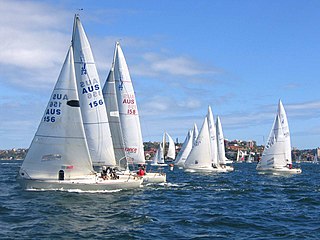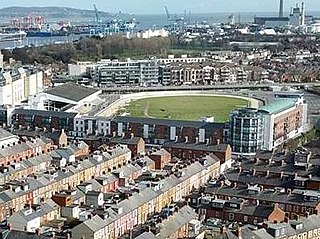Related Research Articles

The EnglishGreyhound, or simply the Greyhound, is a breed of dog, a sighthound which has been bred for coursing game and greyhound racing. Since the rise in large-scale adoption of retired racing Greyhounds, the breed has seen a resurgence in popularity as a family pet.

Harness racing is a form of horse racing in which the horses race at a specific gait. They usually pull a two-wheeled cart called a sulky, or spider, occupied by a driver. In Europe, and less frequently in Australia and New Zealand, races with jockeys riding directly on saddled trotters are also conducted.
Conditions races are horse races in which the weights carried by the runners are laid down by the conditions attached to the race. Weights are allocated according to the sex of the runners, with female runners carrying less weight than males; the age of the runners, with younger horses receiving weight from older runners to allow for relative maturity, referred to as weight for age; and the quality of the runners, with horses that have won certain values of races giving weight to less successful entrants.

Mick the Miller was a male brindle Greyhound. He is celebrated as the first great racing greyhound to compete in England. Despite a short three-year racing career, his achievements were highly publicised around the world and by the end of his career he had become an icon in the sport. His achievements include winning nineteen races in a row, including the English Greyhound Derby on two successive occasions. He suffered an injury at Wimbledon Stadium whilst racing which broke the streak in 1931, and once recovered was beaten in the attempt to win a third Derby title. He went on to appear in films, and is still considered one of the greatest sporting heroes in the UK.

Handicapping, in sport and games, is the practice of assigning advantage through scoring compensation or other advantage given to different contestants to equalize the chances of winning. The word also applies to the various methods by which the advantage is calculated. In principle, a more experienced participant is disadvantaged, or a less experienced or capable participant is advantaged, in order to make it possible for the less experienced participant to win whilst maintaining fairness. Handicapping is used in scoring many games and competitive sports, including go, shogi, chess, croquet, golf, bowling, polo, basketball, and track and field events. Handicap races are common in clubs which encourage all levels of participants, such as swimming or in cycling clubs and sailing clubs, or which allow participants with a variety of standards of equipment. Often races, contests or tournaments where this practice is competitively employed are known as Handicaps.
Group races, also known as Pattern races, or Graded races in some jurisdictions, are the highest level of races in Thoroughbred horse racing. They include most of the world's iconic races, such as, in Europe, the Derby, Irish Derby and Prix de l'Arc de Triomphe, in Australia, the Melbourne Cup and in the United States, the Kentucky Derby and Breeders' Cup races. Victory in these races marks a horse as being particularly talented, if not exceptional, and they are extremely important in determining stud values. They are also sometimes referred to as Black type races, since any horse that has won one of these races is printed in bold type in sales catalogues.

Belle Vue Stadium was a greyhound racing track in Belle Vue, Manchester, England, where the first race around an oval track in Britain was held on 24 July 1926. It has also been used for motorcycle speedway, as the home ground of Elite League team Belle Vue Aces from 1988 until 2015, and from 1999 until 2019 for stock car racing and banger racing.

Greyhound racing is a sport in the United Kingdom. The industry uses a Parimutuel betting tote system with on-course and off-course betting available. Attendances have declined in recent years, partly due to the decrease in evening fixtures with the majority of fixtures being held in the daytime.

Kinsley greyhound stadium is a Greyhound Board of Great Britain regulated greyhound racing stadium situated in Kinsley, West Yorkshire, England. It was voted "Best National Greyhound Racing Club greyhound stadium in the north" by the British Greyhound Racing Board for 2008.

Sunderland Greyhound Stadium is a greyhound racing track situated at Fulwell in the City of Sunderland and English county of Tyne and Wear. The stadium is owned by ARC and racing takes place every Wednesday and Friday evening as well as an additional BAGS meeting on Tuesdays, Thursdays and Sundays. The circumference of the track is 378 metres.

The sport of sailing involves a variety of competitive sailing formats that are sanctioned through various sailing federations and yacht clubs. Racing disciplines include matches within a fleet of sailing craft, between a pair thereof or among teams. Additionally, there are specialized competitions that include setting speed records. Racing formats include both closed courses and point-to-point contests; they may be in sheltered waters, coast-wise or on the open ocean. Most competitions are held within defined classes or ratings that either entail one type of sailing craft to ensure a contest primarily of skill or rating the sailing craft to create classifications or handicaps.
Pelaw Grange Stadium is a Greyhound Board of Great Britain regulated greyhound racing track located at North Lodge in the English county of Durham, between Chester-le-Street and Gateshead. The stadium has a restaurant and a number of bars and has been owned by the McKenna family since January 1965.

White City Greyhounds was the greyhound racing operation held at White City Stadium in London. The venue was regarded as the sport's primary track during its existence.

Greyhound racing is a popular sport in Ireland. There are 17 stadiums operating in Ireland of which nine are fully operated by Rásaíocht Con Éireann / Greyhound Racing Ireland with the remaining six owned and operated by private enterprise but licensed by GRI.
Dernier Empereur was an American-bred Thoroughbred racehorse and sire. He was originally sent to race in France where he had considerable success, winning the Prix Guillaume d'Ornano and La Coupe de Maisons-Laffitte as well as finishing second in the Prix du Jockey Club as a three-year-old in 1993. In the following year he recorded his biggest success when he won the Champion Stakes in England. As a six-year-old he was transferred to the United States where he won the Del Mar Handicap and the Carleton F. Burke Handicap before his racing career was ended by injury. He made very little impact as a breeding stallion.
Stenhouse Stadium was a greyhound racing track and trotting track in Edinburgh.
The 1964 Greyhound Derby took place during June with the final being held on 27 June 1964 at White City Stadium. The winner was Hack up Chieftain and the winning owner Mr S Donohue received £3,000. He was bred by Leslie McNair.

A handicap race in horse racing is a race in which horses carry different weights, allocated by the handicapper. A better horse will carry a heavier weight, to give it a disadvantage when racing against slower horses.
The 2009 UK & Ireland Greyhound Racing Year was the 84th year of greyhound racing in the United Kingdom and Ireland.
The 2019 Star Sports, ARC & LPS Greyhound Derby took place during May and June with the final being held on 29 June 2019 at Nottingham Greyhound Stadium.
References
- ↑ "Glossary". Bettingonthedogs.co.uk.
- ↑ "Rules of Racing" (PDF). Greyhound Board of Great Britain. Archived from the original (PDF) on 2018-08-10. Retrieved 2018-09-19.